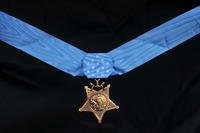Staff Sgt. Leon Weckstein received the Legion of Merit because of his remarkable powers of observation.
"I really did have unusual powers of observation, particularly a latent aptitude for discerning a camouflaged Panzer tank or a dug-in, machine-gun position before anyone else could," he said.
In his aptly named memoirs, "Through My Eyes: The 91st Infantry Division in the Italian Campaign 1942-1945," Weckstein recalls that he had been observant since childhood ("I could see a garter snake slither through the fall leaves long before the other kids did"), but his draftee training honed his skills to a fine degree.
Perhaps Weckstein's well-known powers of observation were what led his colonel to send the intelligence sergeant on a unique mission. It was a steamy summer in 1944, and Weckstein's unit was in Pisa trying to regain the city for the Allies. Word came that the Germans might have reconnaissance guards stationed in the city's famed tower. Weckstein and his radioman, Tech. Sgt. Charles King, were to approach the target, fix it in their sights and destroy it.
From an olive grove, they waited and watched the building that the soldiers had dubbed "the tiltin' Hilton." "There wasn't a single doubt in my audacious, 23-year-old mind that I really was about to do the deed, to direct sallies of doomsday fusillades against one of the world's most famous monuments," Weckstein wrote.
But even as Weckstein kept the elaborately elegant tower in his sights, the day grew hotter, and "... to my utter amazement and chagrin, the marble tower suddenly turned into a vibrating mass of white, ... undulating ... in a kind of dance." The intense heat waves made accurate firing difficult.
Just as Weckstein thought, "The hell with orders, I'll just go ahead and fire," he and King came under an airborne attack that forced them to retreat. They dodged shrapnel and radioed back that their position had become untenable. The reply was for them to get out, as the higher-ups spared the tower.
Weckstein believes destroying the Leaning Tower of Pisa would have been a "sacrilege," but he also knows that if destroying it meant saving "even one of my comrades," he would have done it. Did he wait too long, he wonders. Were the Germans really in the tower?
Weckstein will never know the answers to these questions, but he did receive some closure when he and his wife, Mimi, returned to the spot in 1978. "I could easily have been looking at shattered marble ruins ... if not for an act of fate," he said.
Want to Know More About the Military?
Be sure to get the latest news about the U.S. military, as well as critical info about how to join and all the benefits of service. Subscribe to Military.com and receive customized updates delivered straight to your inbox.















